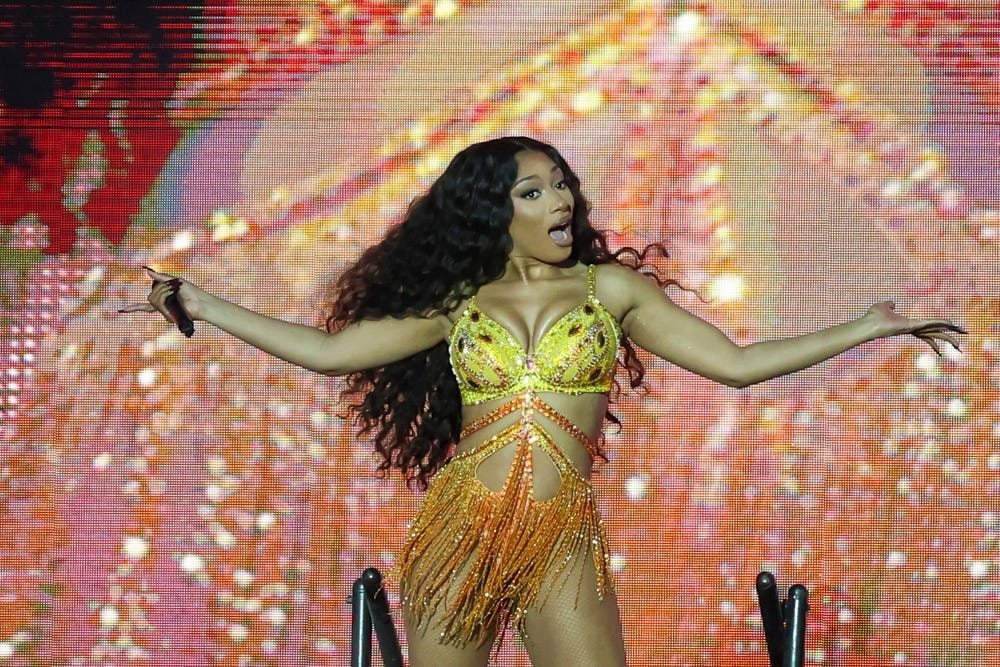
By Michael Franklin
Megan Thee Stallion was shot in July 2020. That’s not speculation, it’s not up for debate, and it’s not just celebrity gossip—it’s a documented, prosecuted, and now legally concluded fact. But for years, what should have been a straightforward case of violence against a Black woman spiraled into a referendum on her body, her character, and her credibility. Megan’s shooter, rapper Tory Lanez, was convicted on three felony charges by a Los Angeles jury in 2022 and sentenced to 10 years in prison. And still, somehow, public discourse continues to punish her for surviving.
Before, during, and after the case, Lanez’s team aggressively courted social media to rewrite the narrative, and many in the music industry and media—who should have known better—either stayed silent or chose sides. Even after Megan presented medical evidence, witness testimony, and lived trauma, the question persisted in the public sphere: Was she telling the truth?
Legal reporter Meghann Cuniff, known online as “Meghann Thee Reporter,” provided some of the only grounded, thorough trial coverage that cut through the noise. She reported the facts and documented the sheer chaos surrounding the trial, from Instagram misinformation to coordinated online smear campaigns against Megan. What should have been a story of accountability instead exposed how easy it is to instill doubt about a Black woman publicly despite facts. A core reason that doubt is so easy to instill is the very real concept of misogynoir. Misogynoir (pronounced mi-soj-uhn-nwar) describes the intersection of anti-Blackness and misogyny that Black women uniquely experience, particularly within popular culture and digital media.
Because of misogynoir, the doubt toward Megan Thee Stallion didn’t end with the verdict. It has evolved. Last week, Rep. Anna Paulina Luna (R-Fla.) publicly called on California Gov. Gavin Newsom to pardon Lanez, parroting unfounded claims of political persecution and flawed evidence. Fringe outlets like OAN have tried to frame Lanez as a victim of the system.
The same disinformation Lanez stoked during his trial is now being repackaged and weaponized by the right, not just to undermine Megan but also to test new ways to appeal to Black men based on current cultural conversations. It’s the same playbook and calculated strategy we’ve seen with targeted messaging and false narratives around Black fatherhood, gender roles, and manhood. This disinformation machine isn’t operating in isolation. It’s being fed by deliberate, high-profile moves that attempt to falsely signal to Black men that conservatives are aligned with Black culture despite anti-Black policies. The recent pardons of Larry Hoover and NBA Youngboy are part of that strategy.
If we don’t counter it, and if Black men don’t lead the resistance to it, we will lose the narrative—and voters along with it.
What Luna and right-wing outlets are doing is simple. They’re inserting themselves into cultural moments to try to fracture the Black electorate, pushing the false choice that standing with Black women somehow means standing against Black men. It’s wrong. It’s insulting. It misrepresents the legacy of Black men who’ve long stood up for Black women. And though most Black men actively support Black women, vocal minorities amplified by actors with malicious intent create distrust and divisions.
This disconnect between policy and culture is exactly what the progressive movement fails to understand. Most people aren’t tracking policy reauthorizations or floor amendments. They’re tracking moments. And when those moments come, like the trial and conviction of Lanez, the silence from Democratic leadership makes hard-won policy victories that Democrats like to tout, like the Violence Against Women Act, feel abstract and inauthentic. Yes, Democrats played a crucial role in reauthorizing the Violence Against Women Act. But what does that mean to the average voter when you can’t even name the violence in front of you in a cultural flashpoint involving a world-famous Black woman?
When the culture demands clarity, you respond to that moment with expertise and actions that match your words. If you don’t engage when misogynoir is on full display, then your policy work rings hollow and cedes narrative control, allowing disinformation to take hold very quickly.
There should have been a loud, coordinated, public response from Black men inside and outside of Congress condemning Lanez’s actions, defending Megan’s dignity, and rejecting the disinformation campaign around her. Instead, the silence created a vacuum — one that the far-right is more than happy to fill. Luna or OAN or anonymous internet trolls cannot be the loudest voices speaking to Black men about this moment.
Protecting Black women isn’t just a cultural slogan. It’s a political responsibility. And it cannot fall solely on Black women to do the lifting. We saw Black women in Congress, such as Rep. Maxine Waters and the late Rep. Sheila Jackson Lee, support Megan, affirming her courage at the height of the trial. Now, Black men inside and outside of Congress should take the baton and speak up in this moment. Megan had to survive the shooting and endure a cultural pile-on that questioned her honesty, her body, and her worth. And when she finally got a conviction? She was met with more doubt.
Megan Thee Stallion deserves our support. And as Black men, we should reaffirm that Tory Lanez does not represent us.
Michael Franklin is the Founder and Chief Thought Leadership Officer of Words Normalize Behavior, a speechwriting, executive communications, and coalition-building agency.




Political scientists have demonstrated on many occasions that when peoples values go against their interests, they will vote their values even to the detriment of their own interests and that is what the right is taking advantage of
Rep Luna is as fringe as you can get.